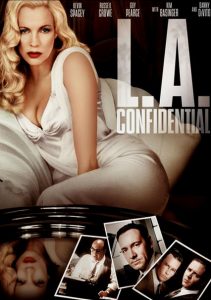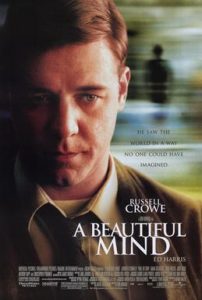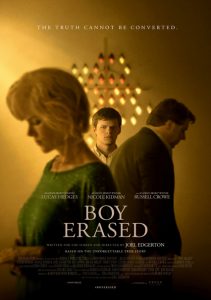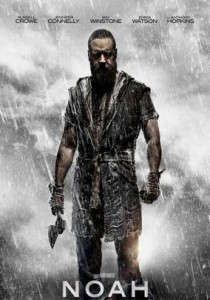L.A. Confidential-1997
Director Curtis Hanson
Starring Kevin Spacey, Russell Crowe, Kim Basinger
Scott’s Review #1,102
Reviewed January 19, 2021
Grade: A
An enormous critical and commercial hit of 1997, L.A. Confidential spins a tale of intrigue and mystery during the 1950s with plenty of big-name stars to go around.
The film can be classified as a throwback, neo-noir escapade, but it’s quite stylistic and fleshed out. It’s well-made with slick elements and Hollywood looks and feels like the lavish production design and musical score, but it’s the seduction and bevy of secrets that will keep viewers glued to their seats, trying to guess what happens next.
As if it doesn’t have enough great elements a powerful whodunit is constructed leading viewers to question if the bad guys are good or the good guys bad.
Stalwarts like Kevin Spacey, Kim Basinger, and Danny DeVito bring star power, while unknowns at the time, Russell Crowe and Guy Pearce are the real reasons to tune in.
L.A. Confidential has a seemingly endless tangled web to absorb and unravel, but the film is paced well and never overcomplicates itself. The strong art direction and musical score make it a delight to the eyes and ears.
The film is fraught with a saucerful of secrets just waiting to be brought to the surface.
Based on the James Ellroy 1990 novel of the same name, it’s the third book in his L.A. Quartet series, the others being The Black Dahlia (1987) and The Big Nowhere (1988). All focus on the Los Angeles Police Department, corruption, and scandal. The former was turned into an unsuccessful film in 2006 starring Josh Hartnett and Scarlett Johansson.
I love films set in the City of Angels with a focus on Hollywood darkness lurking beneath the sunny and swanky exterior. Especially effective is the 1950s time, post World War II, when everything seemed to be coming up roses.
Naturally, murder is the offering of the day.
To summarize, three policemen, each with his motives and obsessions, tackle the corruption surrounding an unsolved murder at a downtown Los Angeles coffee shop in the early 1950s.
Detective Lieutenant Exley (Pearce), the son of a murdered detective, is out to avenge his father’s killing. The ex-partner of Officer White (Crowe), implicated in a scandal uncovered by Exley, was one of the victims.
Sergeant Vincennes (Spacey) feeds classified information to a tabloid magnate (DeVito). Basinger portrays Lynn Bracken, as a glamorous prostitute.
It’s nice watching the film with the knowledge of the big stars Crowe and Pearce would become. Also interesting is to see Spacey when he was a big star, eventually destined to turn into Hollywood mud due to a scandal.
That’s the beauty of watching a classic film and adds a realistic element unknown at the time of the first release.
From a romantic angle, it’s fun and juicy to wonder who Lynn, a Veronica Lake lookalike, will wind up with. Basinger has chemistry with all of the handsome cops and one wonders who she will screw and screw over.
The role is the best of Basinger’s career.
L.A. Confidential is a film that can be viewed multiple times to notice intricacies missed during the first go-around. It harkens back to the 1940s in style, pizazz, and texture. There is something for everyone and it develops well beyond the film noir genre.
It contains great acting, exceptional writing with twisting storylines and events, bloodshed, and thrills. It is an exceptional crime drama almost on par with one of the greats, Chinatown (1974).
The 1990s was an excellent decade for well-made films and L.A. Confidential (1997) is near the top of the pile.
Oscar Nominations: 2 wins-Best Picture, Best Director-Curtis Hanson, Best Supporting Actress-Kim Basinger (won), Best Screenplay Based on Material Previously Produced or Published (won), Best Original Dramatic Score, Best Sound, Best Art Direction, Best Cinematography, Best Film Editing



